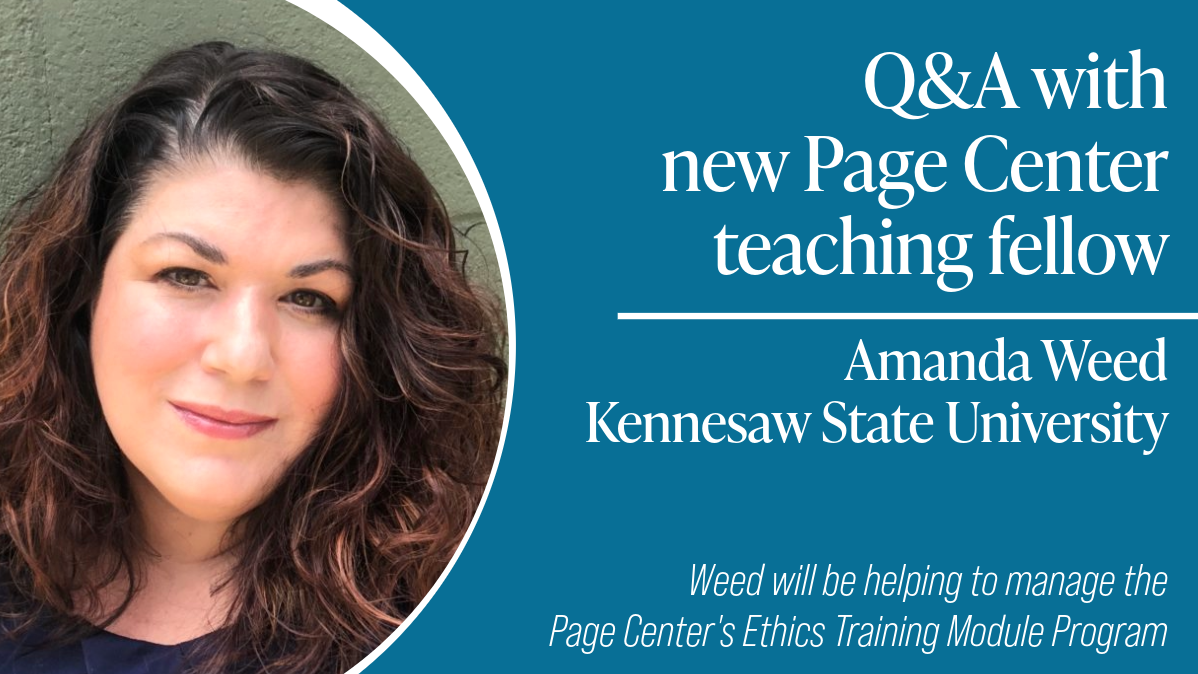Commitment to education is how new Page Center teaching fellow ‘pays it forward’
May 13, 2024 • Jonathan McVerry

Amanda Weed, a pedagogy in advertising and public relations expert, credits her success to the mentors and teachers in her life. Their influence inspired her academic path in having a positive impact on the state of education. She joins the Page Center as its first teaching fellow. In this role, she’ll manage the Center’s 15 (and growing) ethics training modules. The module program has been a popular resource for hundreds of instructors around the world. The 15 topics cover a lot of ground in the public relations sphere, including digital media ethics, diversity, global ethics and more. More than 20,000 students have completed at least one module. As a teaching fellow, Weed will help develop, manage and streamline the scholar-made modules to better serve both instructors and students.
Weed is an assistant professor of digital and emerging media at Kennesaw State University where she recently received promotion and tenure. Weed is also the faculty adviser of Kennesaw PRSSA, and awards-winning chapter of the Public Relations Society of America at Kennesaw State. She currently serves as an associate editor for the Journal of Public Relations Education, as a member of the AEJMC Standing Committee on Teaching, and teaching chair for the AEJMC Public Relations Division.
Can you talk about your research and how it relates to teaching?
My involvement with pedagogy research started with my dissertation. I did an assessment of public relations programs aligning with industry needs. That love has continued. I've focused on research with PRSSA – supporting faculty advisors, best practices for chapter management, and student leaders and how we’re preparing them for the industry through experiential learning. My current research focuses on how we can advance pedagogy research and training in Ph.D. programs to better prepare the next generation of faculty to teach.
What drives your interest in learning how teachers teach and how students learn?
The reason that I pursued this research is because this is where I want to leave my legacy. I want to improve the state of higher education, specifically within the journalism, mass communication and strategic communication disciplines. I had a lot of amazing mentors and professors that shepherded me up along the way. At points, they could have just given up on me, but they continued to push me and to support me. So, doing this type of research is my way of paying it forward. I’m not just doing a single experimental study that will maybe apply to one particular, very controlled situation. This is about making a long-term impact on the state of education. But being able to give back, that's my north star. That really guides everything that I do.
What made you interested in working with the Page Center and its ethics training modules?
I've been integrating the Page Center modules in my classes for many years. It's something I've always seen a value in as an enhancement to my classes. And I love the fact that it's available to anyone, not just students. The training program is multi-dimensional, which I really appreciate. It's not just looking at the ethics of our industry through a single lens. It's looking at it through multiple perspectives, multiple outcomes and multiple use cases. The ethical practice of public relations is something that shouldn't be the last thought we have when developing strategic communication. It should always be the first thing that we consider.
Which modules do you use in your classes?
I use the first four modules (1) Introduction to Public Relations Ethics 2) Core Ethical Principles 3) Professional Codes of Ethics 4) Ethical Decision Making) in my classes. I couldn’t integrate all of them just because of the breadth of the program. That would be impressive. Right now, there’s 15 modules. That could work perfectly with a typical semester. I do think about moving toward a model of where certain modules have certificates or micro-credential badging.

